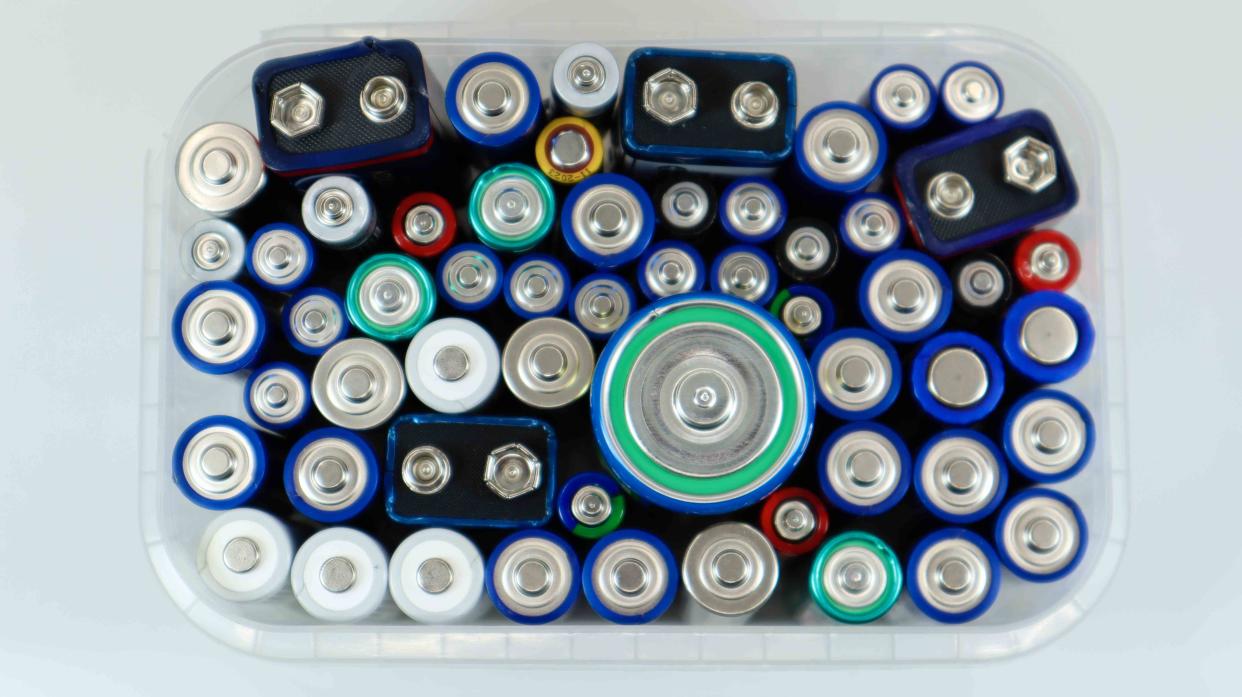You Might Be Storing Your Batteries Wrong—Here's How to Store Them the Right Way

Yevhen Roshchyn / Getty Images
We’re all probably guilty of tossing loose batteries in a junk drawer. But did you know that this is a potentially dangerous habit, one that could actually start a fire?
Luckily, we’ve put together the best practices on how to store batteries so they aren’t a safety risk, you'll always know where your working batteries are, and so they last longer.
Store in Original Packaging
Although cumbersome, the original packaging offers the best conditions for storing batteries in the long term. It safeguards against overheating, moisture, and dust exposure.
Moreover, the separate slots prevent the plus (+) and minus (–) terminals from rubbing against each other—which can cause a short circuit.
Tip
Seal any open packages with a piece of tape to further protect your batteries from external factors that could affect their longevity and performance.
Or, Opt for a Battery Storage Box
For those who prefer a more organized approach to storing batteries, consider investing in a battery organizer. This is a game-changer if you’re always scrambling to find batteries when you need them the most.
There are tons of options out there, from small cases that fit neatly into drawers to all-in-one storage systems that come with battery testers. Each type of battery will have its designated place, so you can easily grab what you need and refill it as needed. And because the batteries are stored upright in the container, the terminals won’t accidentally touch each other.
Tip
Choose a vapor-proof container if you’re storing the batteries in a place where humidity is high (e.g. the garage, basement, or laundry room). This can help against moisture damage.
Store in Room Temperature Settings
If there’s one way to kill a battery fast, it’s extreme temperatures. Intense heat can cause ruptures and leaks. Conversely, too low a temperature can lead to internal condensation and corrosion. Either case will shorten the expected battery life.
So, despite what many people believe, storing batteries in the fridge/freezer won’t do them any favors—in fact, all major battery brands advise against doing so.
The solution? Keep your batteries in a cool, dry, room-temperature place. This could be in a closet, cupboard, or drawer—as long as it’s away from direct sunlight and heat sources such as ovens, radiators, and boilers.
Avoid Electrical Conduction
Batteries can short-circuit each other or be short-circuited by other conductive objects (e.g. coins, paper clips, keys, or anything metal, really). Once they come into contact, a high electrical current flows. This causes the battery to overheat, which then damages the battery’s internal structure to the point where it leaks, bursts, or worse, catches fire.
To prevent this from happening, you’re better off leaving the batteries in their original packaging or a dedicated battery organizer, as mentioned earlier. But if you don’t want to part with your bag/bin of batteries, be sure to cover the terminals with electrical, duct, or masking tape to isolate them.
Warning
9-volt batteries are more susceptible to short-circuiting since their positive and negative terminals are close together on the same side. This makes it relatively easy for the two posts to connect with a conductor, and thus, become a fire hazard.
Separate by Age
Another faux pas: storing old and new batteries together. Even if you think a battery is dead, it may still contain enough charge to cause a short circuit. Not only that, but mixing old and new batteries (and batteries of different brands) in a device can also cause leaks and ruptures. It's safe to say we've all frantically panicked because of leaking battery acid in our electronic devices.
This is why it’s important to store new and used batteries separately. We recommend using two separate containers (or a drawer divider) so you know which batteries are full and which are not. As for the dead ones, it’s time to throw them out or recycle them, depending on the battery type.
Keep Out of Reach of Children
Have little ones around the house? Store all your batteries up high and hidden away where curious hands can’t reach them. Batteries—especially button batteries, which are often mistaken for candy—are a choking hazard and can be life-threatening if swallowed.
Some good 'inaccessible' locations include inside a locked cabinet/drawer, in a childproof storage box, or at the very least, on a high shelf.
Pay Special Attention to Rechargeable Batteries
If you didn’t know, rechargeable batteries have different charge level requirements for storing. For instance, lithium-ion batteries last longer when stored at half charge (with a voltage of around 3.8V) and should never be stored fully charged.
Conversely, lead-acid batteries need to be fully charged before going into long-term storage. Nickel-based batteries are the hardest to damage, therefore you can keep them at any state of charge.
Side note: All batteries self-discharge over time, so make sure to recharge them every six to nine months according to Energizer. This will help maintain their optimal state.
Read Next: How to Clean Battery Corrosion
Read the original article on The Spruce.

